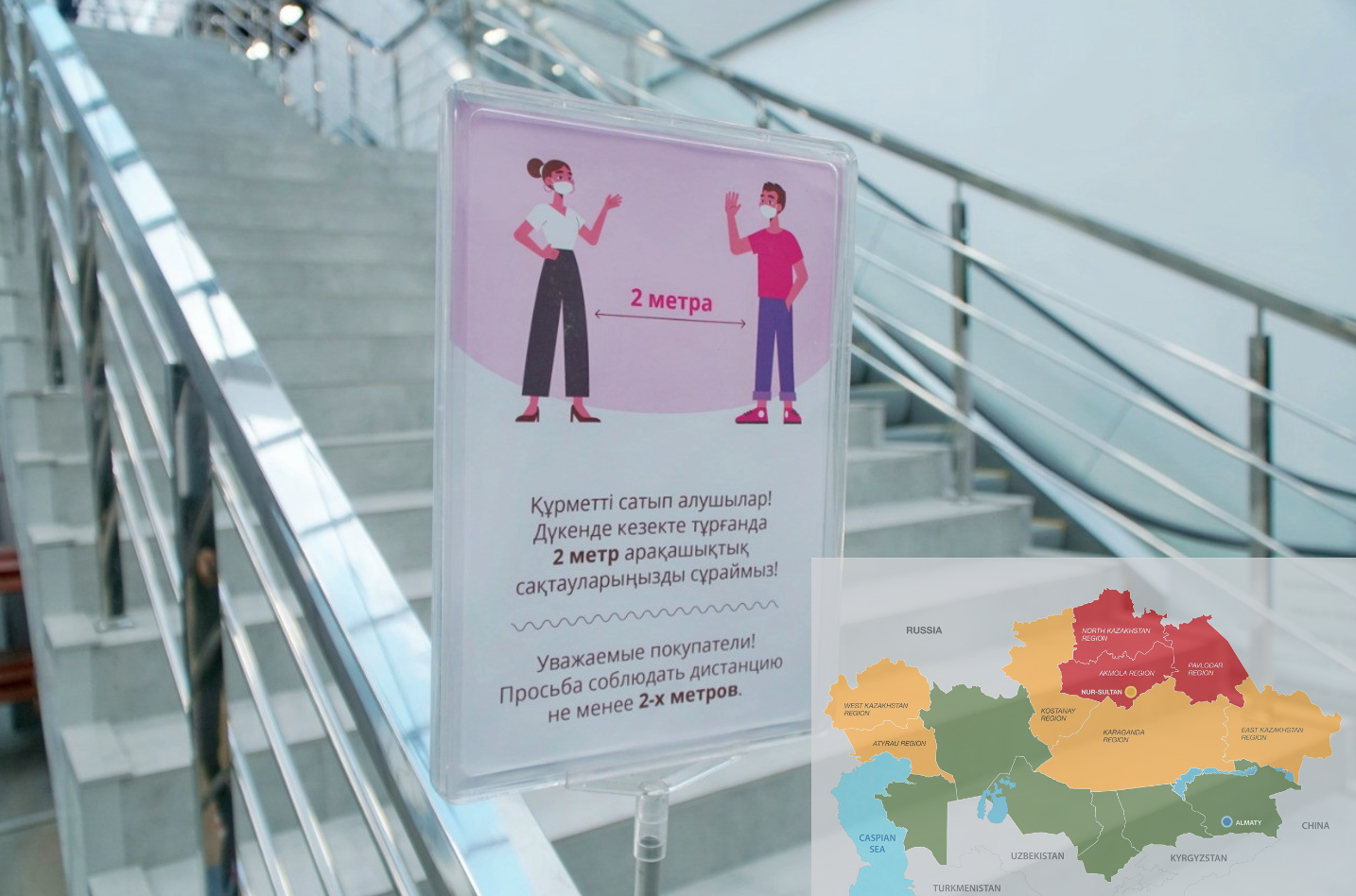NUR-SULTAN – The number of coronavirus cases in Kazakhstan grew 1.4 fold since December, and the regions took stricter measures to curb the spread of the coronavirus infection. Over the past day, Kazakhstan registered 1,186 new cases.

The officials repeatedly say the vaccination is the only way to flatten the curve and reduce the spread of coronavirus infection. Click to see the map in full size.
As of Feb. 5, Kazakhstan reported 192,825 cases since the pandemic began and 2,540 people died from it. It also reported 48,158 coronavirus pneumonia cases that show coronavirus symptoms, but that clinically have not been confirmed as COVID-19. 579 people died from it.
Three regions are currently in the red zone – Akmola, Pavlodar, and the North Kazakhstan regions. Six regions are currently in the yellow zone – the capital city Nur-Sultan, West Kazakhstan, Atyrau, Kostanai, East Kazakhstan, and the Karaganda regions. All other regions remain in the green zone.
Starting Feb. 1, Almaty was supposed to see new restrictions in place, but due to the improved coronavirus situation, the latest decree of the city’s chief doctor did not come into effect.
In Nur-Sultan, restrictions were eased on Feb. 2. Cafes and restaurants were allowed to work until midnight. Previously, they closed at 8 p.m. Trade malls will work all days of the week, except Sundays, and fitness centers resumed their work on weekends.
At the Feb. 3 press briefing, Kazakhstan’s Vice Healthcare Minister Azhar Giniyat said the number of severe cases had declined. There were 317 patients as of Feb. 1 and 310 as of Feb. 3. Of the 310 patients, 57, or 18 percent, are in extremely critical condition, while 52, or 16.8 percent, are connected to a medical ventilator.
As for patients in the intensive care unit, more than 60 percent – 185 out of 310 patients – have chronic cardiovascular diseases, such as diabetes, arterial high blood pressure, obstructive pulmonary disease, obesity, liver cirrhosis, and cancer.
“There are 20,990 beds in hospitals for treatment of the coronavirus infection, and the current occupancy rate is 28 percent in the country. The highest occupancy rate is seen in three regions: West Kazakhstan Region – 52 percent, Almaty Region – 47 percent and Nur-Sultan city – 45 percent,” she said.
Additional, 31,000 beds could be deployed in case the situation worsens.
Starting Feb. 1, Kazakhstan also started a mass vaccination campaign with Russia’s Sputnik V vaccine.
“Just yesterday, Lancet, one of the world’s leading medical journals, reported that the effectiveness of the vaccine (Sputnik) is 91.6 percent. It has also been proven that immunity after the Sputnik vaccine can last for at least two years. It is crucial that the vaccine is also effective against new coronavirus strains,” said Vice Healthcare Minister Yerlan Kiyasov, who also spoke at the briefing.
Giniyat and Kiyasov were among the first to receive the vaccine on Feb. 1. The officials said up to 60 percent of the population needs to be vaccinated to achieve herd immunity, also known as population immunity.
The vaccination is voluntary and free for Kazakh citizens.
“In case the vaccine shows side effects, everyone will be responsible starting from the producer to the medical institutions. Public health departments in the regions have created expert groups that will investigate such cases,” said Kiyasov.
The Kazakh government and the Atameken National Chamber of Entrepreneurs are developing a mobile application called Ashyq (Open) that will require citizens to scan a QR code before entering the businesses whose work was restricted, which will include cinemas, spas, and fitness centers.
The scan will show a person’s risk rating based on the government data and there are four such ratings – red, yellow, blue, and green. The project will be launched in pilot mode in Almaty, Nur-Sultan, and Karaganda.
